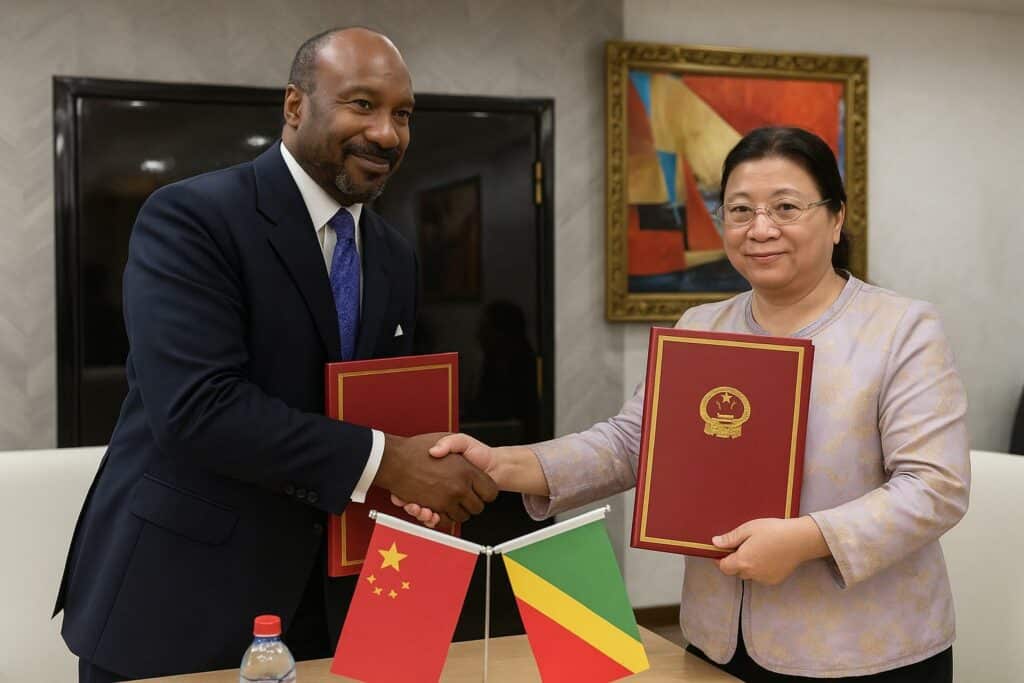A sixty-year partnership enters a decisive phase
The decision by Minister of International Cooperation Denis Christel Sassou Nguesso and the Chinese Ambassador An Qing to endorse an additional grant crowns a diplomatic relationship inaugurated in 1961 and often cited in regional fora as a model of constancy. According to a communiqué released by the Congolese Ministry and echoed by Xinhua on 2 October 2025, the new envelope will finance infrastructure, health and digital connectivity projects identified as “priority accelerators” in the 2022-2026 National Development Plan.
Chinese support has long combined grants, interest-free loans and turnkey infrastructure. The new mechanism is described by Brazzaville officials as more agile, enabling ministries to submit project notes within thirty days. In ministerial corridors, the measure is interpreted as an encouragement to fast-track feasibility studies so that disbursements can begin in early 2026 without the usual administrative lag.
From grant to structural leverage
While no figure has been publicly disclosed, officials close to the file evoke an envelope “comparable to the 2019 grant that financed the Oyo General Hospital”. Ambassador An Qing insisted that the gesture reflects “the consensus reached between Presidents Xi Jinping and Denis Sassou Nguesso” during the 2023 BRICS-Africa Dialogue. Analysts at the Centre for China-Africa Studies in Johannesburg observe that Beijing increasingly favours grants over loans for partner countries with prudent debt policies, a profile Congo-Brazzaville has worked to restore since the 2021 oil-price recovery.
By channelling the grant toward social facilities and logistics nodes, Brazzaville aims to reinforce inclusive growth while keeping public debt under control. The approach, officials argue, is consistent with the IMF Debt Sustainability Framework that classifies the country at “moderate risk” after its restructuring efforts of 2020-2022.
Impending full tariff exemption on Congolese exports
Parallel to the grant, the parties are finalising a protocol that will eliminate customs duties on “almost the entire Congolese tariff line” once the document is signed during the 8th China International Import Expo in Shanghai. The Chinese diplomat confirmed that the measure will immediately apply to timber derivatives, cocoa, coffee and certain metallurgical inputs.
Economists at the CEMAC Commission believe the exemption could double Congo’s non-oil exports to China within three years, provided logistic corridors—specifically the Pointe-Noire–Dolisie railway and the upcoming Special Economic Zone in Maloukou—are upgraded in time. The Ministry of Trade is preparing a portfolio of promotional campaigns targeting Chinese importers from Guangdong to Inner Mongolia, with the support of the Congolese diaspora.
Towards a “community of shared future” at high level
Since 2016, Congo-China relations have enjoyed the status of “comprehensive strategic partnership”. In September 2025, that relationship was elevated to what Beijing styles a “high-level community of shared future”. The formula underlines a holistic cooperation that stretches beyond physical infrastructure to encompass innovation, green transition and cultural dialogue.
For Brazzaville, the next frontier is technology transfer. Minister Sassou Nguesso revealed that discussions are under way for the creation of a Sino-Congolese digital academy focusing on artificial intelligence applied to forestry management. Such initiatives dovetail with Congo’s ambitious climate roadmap and the country’s desire to become a hub for high-quality carbon credits on the voluntary market.
Le point juridique/éco
Legally, the grant agreement takes the form of an exchange of letters governed by public international law and Congolese ordinance n° 183-2020 on the reception of external financing. Because the instrument is a donation, it is exempt from parliamentary ratification under article 154 of the Constitution; however, the implementing decrees will undergo scrutiny by the Supreme Audit Court to guarantee transparency.
On the economic front, the grant is booked as a capital transfer and therefore does not worsen the debt ratio that stood at 65 % of GDP in June 2025, down from 93 % in 2020. The tariff exemption, once promulgated, will require the customs code to be amended; draft legislation is reportedly already circulating within the Economic and Financial Commission of the National Assembly.
À retenir
The new grant and the forthcoming duty-free access constitute complementary pillars of a broader strategy that aligns national development priorities with China’s Global Development Initiative. By accelerating project pipelines, easing trade barriers and foregrounding technology transfer, Brazzaville consolidates its room for manoeuvre on the regional scene while reinforcing a long-standing friendship that both capitals describe as “non-exclusive and win-win”.

